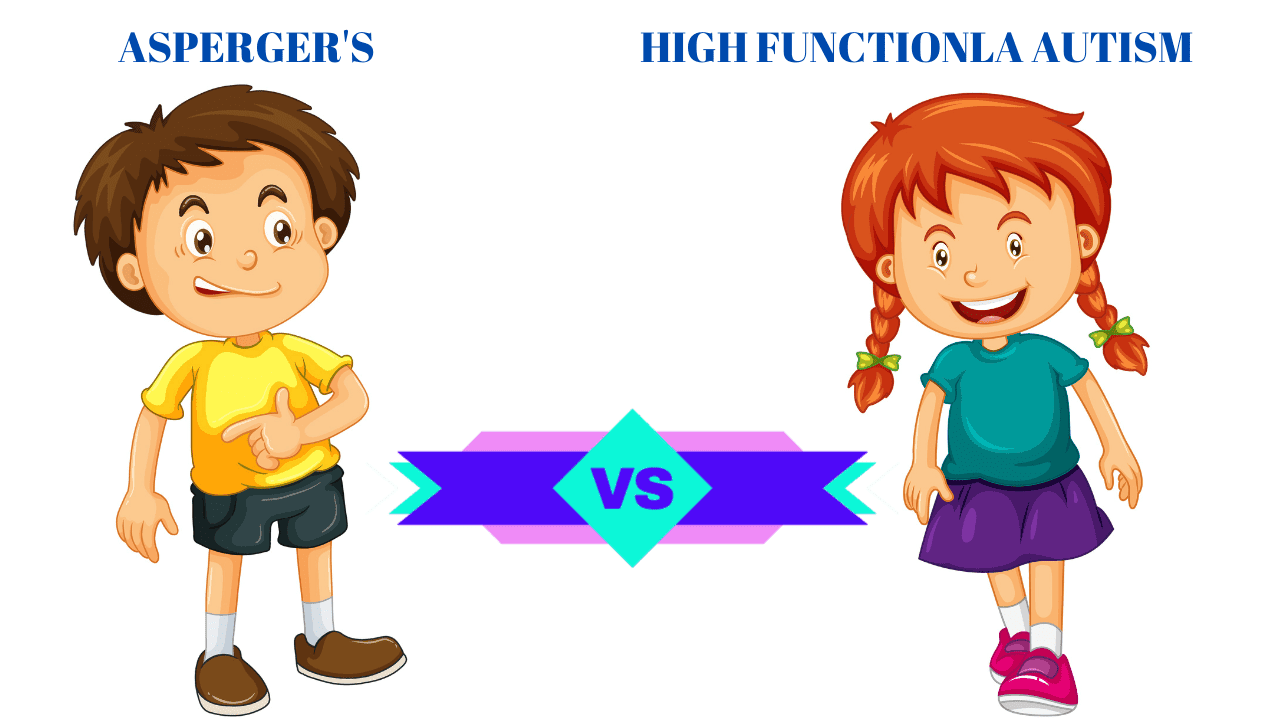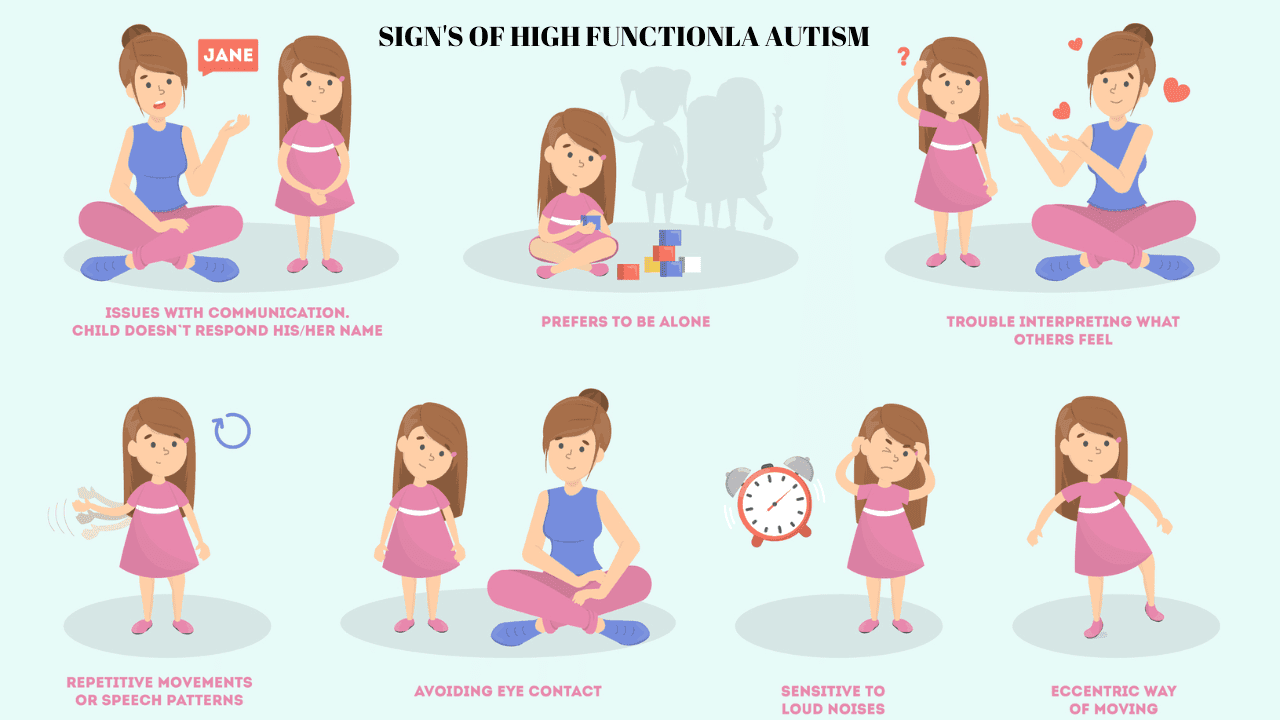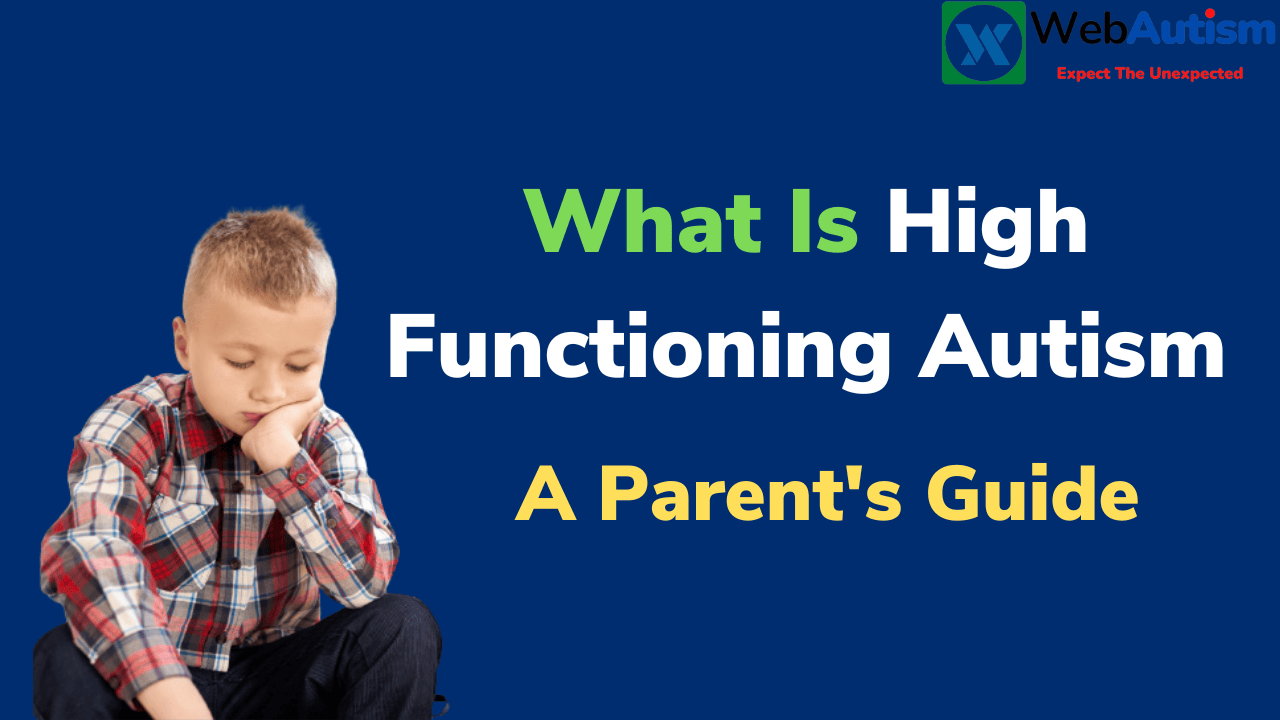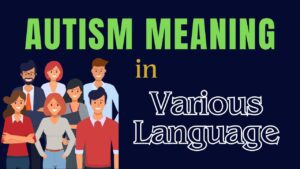High functioning autism is a form of autism that is characterized by relatively high cognitive and verbal skills. Individuals with high functioning autism often have difficulty with social skills, however, and may also exhibit repetitive behaviors.
While there is no cure for high functioning autism, there are a number of strategies that can help individuals manage their symptoms and live fulfilling lives. Early intervention is often critical for individuals with high functioning autism, as is ongoing support from family, friends, and professionals.
If you or someone you know has high functioning autism, there are a number of resources available to help. This blog will provide you with information on high functioning autism, including signs and symptoms, treatment options, and where to find support.
1. What is high functioning autism?
Autism spectrum disorder (ASD) is a complex neurobehavioral condition that affects a person’s ability to communicate and interact with others. ASD is defined by a certain set of behaviors and is a “spectrum” condition, which means that symptoms can range from very mild to very severe.

People with ASD often have problems with social interactions and communication. They may also have repetitive behaviors or interests and may be sensitive to changes in their environment. ASD can range from very mild to severe, and symptoms can vary greatly from one person to another.
High functioning autism (HFA) is a term used to describe people with ASD who have milder symptoms and higher levels of functioning. This means they are able to live relatively normal lives and may even excel in certain areas. People with HFA often have good verbal skills and may be able to hold.
2. How does it differ from other types of autism?
Asperger’s syndrome is one of the most widely known and researched types of autism. It was first described in the 1940s by Austrian psychiatrist Hans Asperger, who observed that some of his patients had difficulty in social interactions, but excelled in areas of special interest.

Asperger’s syndrome is considered to be on the “high-functioning” end of the autism spectrum. Individuals with Asperger’s syndrome typically have good language skills and cognitive abilities. However, they may have difficulty with social skills, nonverbal communication, and emotional regulation.
While Asperger’s syndrome is similar to other types of autism in many ways, there are some important differences. For example, people with Asperger’s syndrome do not typically have delays in language or cognitive development.
3. What are the symptoms of high functioning autism?
Autism spectrum disorder (ASD) is a neurodevelopmental disorder that affects a person’s ability to socialize, communicate, and behave appropriately in various settings. ASD is a broad term that encompasses a range of symptoms, severity, and functional levels. Some people with ASD are considered “high functioning” because they are able to live relatively independent lives and hold down a job.

However, high functioning autism is not a diagnosis in and of itself. It is simply a term used to describe people who have ASD and who are functioning at a higher level than others with the disorder. There is no single set of symptoms that all high functioning autistic people share. However, there are some common symptoms that are associated with high functioning autism, including:
- Difficulty with social interaction
- Difficulty with communication
- Repetitive or unusual behaviors
- Restricted interests
4. How is high functioning autism diagnosed?
There is no one-size-fits-all answer to this question, as the diagnosis of high functioning autism (HFA) can vary depending on the individual and the resources available. However, there are some common steps that are usually involved in the diagnosis of HFA.

First, a comprehensive evaluation is typically conducted, which may include a physical exam, a review of the person’s medical and developmental history, and observations of the person’s behavior. This evaluation may also include tests of the person’s cognitive and communication skills, as well as assessments of their social skills and interests.
After the evaluation is complete, a team of professionals will usually meet to discuss the findings and determine whether or not the person meets the criteria for an HFA diagnosis. If the diagnosis is given, the team will also develop a treatment plan to help the person manage
5. What are the treatments for high functioning autism?
The treatments for high functioning autism (HFA) vary depending on the individual person’s needs. There is no single medical test that can diagnose ASD, but there are some common treatments that can be effective.
Behavioral therapy is often used to help people with HFA learn new skills and cope with the challenges of everyday life. This type of therapy can be helpful in teaching social skills, communication skills, and self-care skills.
Occupational therapy can also be beneficial for people with HFA. This type of therapy can help with fine motor skills, gross motor skills, and daily living skills.
Medicines can also be used to help manage some of the symptoms of HFA. For example, medicines can be used to help with anxiety, depression, and hyperactivity.
Speech therapy can also be helpful for people.
6. Social Challenges
Social challenges in high-functioning autism can manifest in various ways, often impacting how individuals interact, communicate, and form relationships. Here are some specific social challenges commonly associated with high-functioning autism:

- Difficulty with Social Cues: Individuals with high-functioning autism may struggle to understand social cues such as facial expressions, body language, tone of voice, and gestures. This can make it challenging for them to interpret others’ emotions, intentions, or social nuances accurately.
- Limited Social Initiation: They may have difficulty initiating social interactions or maintaining conversations, especially in unfamiliar or complex social situations. This can lead to social withdrawal or appearing disinterested, even when they desire social connection.
- Theory of Mind Differences: Theory of mind refers to the ability to understand that others have beliefs, thoughts, and perspectives different from one’s own. People with high-functioning autism may find it challenging to grasp this concept fully, impacting their ability to predict others’ behavior or empathize with their feelings.
- Difficulty with Social Relationships: Building and maintaining friendships or romantic relationships can be challenging due to struggles with reciprocal social interactions, sharing interests, understanding social boundaries, and navigating social hierarchies or norms.
- Literal Interpretation: Individuals with high-functioning autism may have a tendency to interpret language and communication literally, which can lead to misunderstandings, confusion, or taking statements or jokes too seriously.
- Social Anxiety: Many individuals with high-functioning autism experience social anxiety or discomfort in social settings due to challenges with social interaction and fear of judgment or rejection. This anxiety can further impact their social skills and confidence.
- Rigidity and Resistance to Change: Some individuals may prefer structured routines and resist changes in plans or unexpected social events, leading to difficulties adapting to new social situations or environments.
Addressing these social challenges often involves targeted interventions such as social skills training, cognitive-behavioral therapy, communication strategies, and creating supportive environments that foster understanding and acceptance of neurodiversity.
Repetitive Behaviors
Repetitive behaviors are common among individuals with high-functioning autism and are considered one of the core characteristics of autism spectrum disorder (ASD). These behaviors can manifest in various ways and serve different functions for individuals. Here are some examples and explanations of repetitive behaviors in high-functioning autism:

- Stereotyped Movements: This includes repetitive movements such as hand-flapping, rocking back and forth, spinning objects, or pacing. These behaviors may serve as self-soothing mechanisms or ways to regulate sensory input.
- Rigid Routine Adherence: Many individuals with high-functioning autism prefer sameness and may adhere strictly to routines or rituals. Deviations from these routines can cause distress or anxiety.
- Special Interests: Developing intense, focused interests in specific topics or activities is common. Individuals may immerse themselves in learning everything about their interest, often to a highly detailed or encyclopedic level.
- Repetitive Speech: This can involve echolalia (repeating words or phrases heard previously) or scripting (repeating lines from movies, books, or conversations). Repetitive speech may serve different purposes, such as self-regulation, communication, or expressing comfort.
- Resistance to Change: Individuals with high-functioning autism may struggle with transitions or unexpected changes in their environment or routine. They may exhibit resistance, anxiety, or meltdowns when faced with these changes.
- Fixation on Patterns or Order: Some individuals may focus excessively on patterns, symmetry, or orderliness. For example, arranging objects in a specific way or becoming upset if things are not organized according to their preferences.
- Stimming Behaviors: Stimming (self-stimulatory behavior) refers to repetitive actions like hand-flapping, finger flicking, or body rocking. Stimming can serve various purposes, including managing sensory input, reducing anxiety, or expressing excitement.
It’s important to note that repetitive behaviors can vary widely among individuals with high-functioning autism, and not every person will exhibit all of these behaviors. While these behaviors are characteristic of autism, they can also occur in individuals without autism, such as those with anxiety disorders or obsessive-compulsive disorder (OCD). Understanding the function and purpose of repetitive behaviors is crucial for developing strategies to support individuals with high-functioning autism effectively.
Sensory Sensitivities
Sensory sensitivities are a common aspect of autism spectrum disorder (ASD), including high-functioning autism. These sensitivities refer to heightened or altered responses to sensory stimuli, such as sounds, lights, textures, tastes, and smells. Individuals with sensory sensitivities may experience sensory input differently from neurotypical individuals, leading to challenges in processing and regulating sensory information. Here are some key aspects of sensory sensitivities in high-functioning autism:

- Hypersensitivity: Many individuals with high-functioning autism are hypersensitive to certain sensory stimuli. For example, they may find loud noises, bright lights, strong smells, or certain textures overwhelming or distressing. These hypersensitivities can lead to sensory overload, anxiety, or meltdowns in overwhelming environments.
- Hyposensitivity: On the other hand, some individuals with autism may be hyposensitive or less sensitive to certain sensory stimuli. They may seek out intense sensory experiences or have a high threshold for sensory input, leading to behaviors like seeking out loud noises, spinning, or craving certain textures.
- Sensory Avoidance: Due to hypersensitivities, individuals with high-functioning autism may actively avoid or withdraw from sensory-rich environments or activities that trigger discomfort or distress. For example, they may cover their ears in response to loud noises or avoid crowded places with overwhelming sensory stimuli.
- Sensory Seeking: Conversely, some individuals may engage in sensory-seeking behaviors to fulfill their sensory needs. This can include stimming behaviors like hand-flapping or spinning, seeking out tactile stimulation through certain textures or materials, or seeking intense sensory experiences like swinging or jumping.
- Difficulties with Modulation: Modulation refers to the ability to regulate and modulate sensory input appropriately. Individuals with high-functioning autism may have challenges with sensory modulation, leading to difficulties in filtering out irrelevant sensory information and focusing on relevant cues.
- Impact on Daily Life: Sensory sensitivities can significantly impact daily functioning, including social interactions, communication, academic performance, and participation in daily activities. Sensory challenges may also contribute to difficulties with transitions, changes in routine, and coping with new or unfamiliar environments.
Understanding and addressing sensory sensitivities is crucial in supporting individuals with high-functioning autism. Occupational therapy, sensory integration therapy, environmental modifications (such as providing quiet spaces or using sensory-friendly materials), and sensory tools (like fidget toys or noise-canceling headphones) are some strategies used to help individuals manage sensory challenges and thrive in various environments.
Narrow Interests
Narrow interests, also known as intense or focused interests, are common in individuals with high-functioning autism and are often referred to as a form of “special interest.” These interests involve a deep fascination with specific topics, activities, or objects, leading individuals to invest significant time, energy, and attention into learning about or engaging with these interests. Here are some key points about narrow interests in high-functioning autism:

- Intense Focus: Individuals with high-functioning autism may display an intense focus on a particular subject, hobby, or area of knowledge. This focus often exceeds what is typical for their age or developmental stage.
- Specialized Knowledge: They tend to accumulate detailed and in-depth knowledge about their interests, sometimes reaching an expert level of understanding. This knowledge may encompass facts, statistics, terminology, historical information, or technical details related to their interest.
- Repetitive Engagement: Individuals with narrow interests may engage in their interests repetitively, spending hours researching, reading, practicing, or participating in activities related to their fascination.
- Passionate Engagement: They often exhibit a high level of passion, enthusiasm, and enjoyment when discussing or participating in their special interests. These interests can bring a sense of purpose, identity, and fulfillment to their lives.
- Limited Flexibility: Due to their intense focus, individuals with high-functioning autism may have limited flexibility in shifting their attention away from their narrow interests. They may prefer to spend most of their time engaged in their passion rather than exploring new activities or topics.
- Functional Benefits: While narrow interests can be perceived as restrictive, they can also offer functional benefits. For example, these interests can serve as coping mechanisms for managing stress, anxiety, or sensory overload. They can also foster skills development, creativity, problem-solving abilities, and motivation.
- Social Implications: Narrow interests can impact social interactions, as individuals may prefer to talk extensively about their interests or struggle to connect with others who do not share their passion. However, these interests can also serve as a bridge for forming connections with like-minded individuals who share similar interests.
It’s important to recognize the value of narrow interests in individuals with high-functioning autism and provide opportunities for them to explore, develop, and express their passions while also encouraging a balanced approach that includes exposure to diverse experiences and activities.
Communication Differences
Communication differences are a prominent aspect of high-functioning autism, impacting how individuals with this condition express themselves, interpret information, and interact with others. Here are some key communication differences commonly observed in high-functioning autism:

- Pragmatic Language Challenges: Pragmatic language refers to the social use of language, including understanding and using verbal and nonverbal communication in social contexts. Individuals with high-functioning autism may have difficulty with pragmatic language skills, such as:
– Understanding and appropriately using non-literal language (e.g., idioms, sarcasm, metaphors).
– Recognizing and responding to social cues (e.g., facial expressions, body language, tone of voice) accurately.
– Initiating and maintaining conversations, including turn-taking and topic maintenance.
– Adjusting communication style based on the social context (e.g., formal vs. informal language, appropriate volume and tone).
- Literal Interpretation: Individuals with high-functioning autism often have a tendency to interpret language literally, which can lead to misunderstandings or difficulties understanding figurative language, humor, or subtle nuances in communication.
- Echolalia: Echolalia is a common communication trait in autism spectrum disorder, characterized by repeating words, phrases, or sentences heard previously. This repetition may serve various functions, such as processing language, expressing needs or preferences, or practicing social scripts.
- Difficulty with Social Pragmatics: Social pragmatics refer to the rules and conventions governing social communication. Individuals with high-functioning autism may struggle with:
– Understanding and following conversational rules (e.g., taking turns, staying on topic).
– Using appropriate greetings, farewells, and social niceties.
– Interpreting and responding to nonverbal communication cues (e.g., facial expressions, gestures) accurately.
- Monotone or Unusual Speech Patterns: Some individuals with high-functioning autism may speak in a monotone or have atypical speech patterns, such as a robotic or formal tone, lacking typical intonation or emotional expressiveness.
- Difficulty with Abstract Language: Abstract language, including concepts like emotions, perspectives, and hypothetical scenarios, can be challenging for individuals with high-functioning autism to grasp and express.
- Scripted Communication: In social situations, individuals with high-functioning autism may rely on scripted or rehearsed phrases or responses, especially when faced with unfamiliar or unpredictable interactions.
Understanding these communication differences is essential for supporting individuals with high-functioning autism in developing effective communication strategies, improving social interactions, and fostering meaningful connections with others. Speech therapy, social skills training, visual supports, and structured communication interventions can be valuable in addressing these communication challenges.
Routines and Predictability
Routines and predictability play a crucial role in the lives of individuals with high-functioning autism (HFA). These individuals often thrive in structured environments with predictable routines, as it provides them with a sense of stability, comfort, and control. Here are some key aspects of routines and predictability in HFA:

- Routine Adherence: Individuals with HFA typically prefer adherence to established routines and may become anxious or distressed when routines are disrupted or changed unexpectedly. Routines can encompass daily schedules, rituals, and specific sequences of activities.
- Predictable Environments: Structured and predictable environments, where expectations are clear and consistent, are beneficial for individuals with HFA. Predictability helps reduce anxiety, improve understanding of expectations, and enhance overall functioning.
- Difficulty with Transitions: Changes in routine or transitions between activities can be challenging for individuals with HFA. They may require additional support, visual cues, or advance notice to prepare for transitions effectively.
- Need for Warning and Preparation: Providing warnings or visual schedules can help individuals with HFA prepare for upcoming changes or transitions. This proactive approach allows them to anticipate what will happen next and reduces stress and uncertainty.
- Preference for Familiarity: Familiarity with people, places, and routines is comforting for individuals with HFA. They may exhibit reluctance or resistance when faced with new or unfamiliar situations, requiring gradual exposure and support to adapt.
- Sense of Control: Routines and predictability offer individuals with HFA a sense of control over their environment and activities. Having control over familiar routines can increase their confidence, independence, and overall well-being.
- Flexibility Challenges: While routines and predictability are beneficial, individuals with HFA may struggle with flexibility and adaptability in situations that deviate from their established routines. Building flexibility skills and coping strategies can support them in navigating changes more effectively.
- Supportive Strategies: Visual schedules, timers, social stories, and consistent communication about changes or upcoming events are helpful strategies for supporting individuals with HFA in managing routines and predictability.
Understanding and respecting the importance of routines and predictability is essential for caregivers, educators, and support professionals working with individuals with HFA. By incorporating structured routines, clear expectations, and supportive strategies, it becomes easier to create environments that promote comfort, independence, and success for individuals with HFA.
To wrap things up
While there is still much to learn about high functioning autism, we now know more than ever before about this complex condition.
With advances in technology and treatments, people with high functioning autism are able to live full and productive lives.
Early diagnosis and intervention can make a big difference in the lives of those affected by the condition. With the right support and care, people with high functioning autism can lead happy and successful lives.
There are a variety of symptoms and causes, but the most important thing is to get help if you think you or someone you know may have it.
If you liked this article, please follow us for more information on autism and other mental health conditions.
Thanks for reading!





